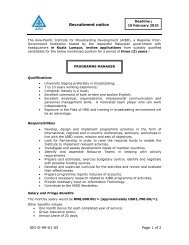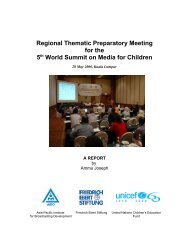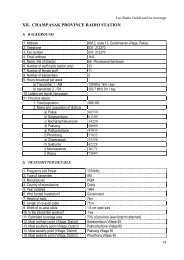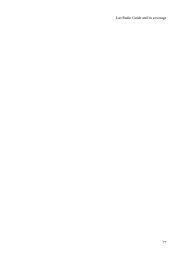FINAL REPORT Media Law to unesco july1.pdf - AIBD
FINAL REPORT Media Law to unesco july1.pdf - AIBD
FINAL REPORT Media Law to unesco july1.pdf - AIBD
Create successful ePaper yourself
Turn your PDF publications into a flip-book with our unique Google optimized e-Paper software.
Summing up the first panel discussion, Dr Iyer said that it provided<br />
“a lot of food for thought”. He gave his opinion <strong>to</strong> Gopal<br />
Sreenevasan’s explanations, especially referring <strong>to</strong> the lack of an<br />
“efficient system of enforcement” the lawyer had brought up, which<br />
might, in fact, result in a “denial of justice”. He cited a defamation<br />
case involving US investigative journalist Seymour Hersh and the<br />
former Indian Prime Minister Morarji Desai. The suit was eventually<br />
filed shortly before Desai passed away. Dr Iyer then invited<br />
participate <strong>to</strong> further comment and ask questions.<br />
Malaysian Jaspal Kaur raised the enforcement issue as well. She<br />
referred <strong>to</strong> the difficulties, if providers such as you tube are not<br />
willing <strong>to</strong> take down offensive material. Sreenevasan shared this<br />
view and said that it was indeed difficult <strong>to</strong> persuade US providers<br />
<strong>to</strong> take something offline, even “with a recognized judgment” such<br />
as a court order. Kaur also stressed the “need for a moderating<br />
body” in relation <strong>to</strong> content, since she observed not enough debate<br />
between government and bloggers.<br />
Maintaining that liability was handled very differently in various<br />
countries, Jacob van Kokswijk also opted for an independent<br />
committee or court and an agreement between countries “about<br />
what is allowed and what not”. Dr Iyer, however, said that “we can’t<br />
have universal agreement in terms of content”, as long as<br />
sovereignty was an issue. In the end, one had <strong>to</strong> rely on national<br />
jurisdiction, he summarized.<br />
Once more, Steve Buckley brought up the freedom of expression<br />
perspective in stressing that he considered any content regulation<br />
as worrying, especially in the context of diverse approaches on<br />
internet regulation and numerous attempts of internet censorship.<br />
Gopal Sreenevasan shared his concerns, especially with regard <strong>to</strong><br />
restrictive legislation apart from defamation laws. He specifically<br />
referred <strong>to</strong> the Malaysian blogger case and the damaging effects of<br />
the Sedition Act.<br />
Robert Beveridge <strong>to</strong>ok up Kokswijk’s argument of the Internet as a<br />
<strong>to</strong>ol that is empowering the user and challenged this as a “very<br />
technological, u<strong>to</strong>pian view of the world”. He asked what effect<br />
citizen journalism had on the standards of quality and integrity of<br />
information as set by established news sources such as the BBC. He<br />
argued that the empowerment could easily turn out <strong>to</strong> be a<br />
“disempowerment”. In reply, Kokswijk put forward the argument of<br />
the politically mature user, who is capable <strong>to</strong> make independent<br />
judgments on the quality of information precisely because he is<br />
media literate. He also asked: “Why should we accept that only<br />
the BBC has the best news?” Gopal Sreenevasan said that the<br />
20






